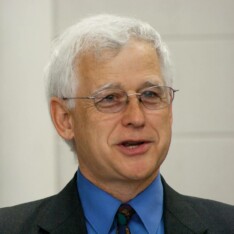Tyler Cowen Doubles Down

I criticized (here and here) a recent article that Tyler Cowen wrote in Bloomberg about COVID-19 and lockdowns. Last week he doubled down by raising the issue of the elderly. The title fits his theme, is “Yes, Covid-19 Is More Serious for the Elderly. So What?”
Cowen starts with an analogy to 9/11. (Everything in quotes is from his article.)
“Consider 9/11, when some 3,000 Americans died. The U.S. mounted a very activist response that included new security procedures at airports, crackdowns on money laundering, increased surveillance and two wars. Not all of those choices were prudent, but nonetheless they qualify as a very vigorous response.”
All true, but I wonder what point he is making. Then he gets to it.
“The point is this: Had 3 Americans been killed rather than 3,000 — if, say, 9/11 was a U.S. holiday the hijackers didn’t know about, so fewer people were working — the optimal response would not have been all that different. There were a lot of casualties, but it is also significant that several airplanes were brazenly hijacked and flown into major iconic buildings, the Pentagon was hit, and Congress itself came under threat.”
He says that “the optimal response” with 3 deaths plus the iconic destruction would not have been “all that different.” I gather he means that it would not be all that different from what would have been the optimal response with the actual 3,000 deaths. But he does not tell us what the optimal response to that was. Isn’t that the nub of the debate over lockdowns—what is the proper response?
I count Bush’s war on Iraq as one of the most evil government policies of this century. Even if you don’t agree, it was big. So if we got close to the optimal response, then Cowen is saying that the Iraq war was close to optimal. And, by the way, in case he or you need reminding, that war caused many thousands of deaths of young, old, and in-between. Almost all were relatively innocent.
“Polities that do not respond to such attacks [as 9/11] soon find themselves out of business. Not only do they invite further intimidations, but their citizens lose faith in the government’s ability to maintain public order or shape the future of the nation. The entire U.S. system of government may well have been at stake in the decision to respond to 9/11 in a significant way.”
Even for things like 9/11, we should reject Cowen’s argument. It would have to apply to every government whose country is attacked. Ethical principles generalize, or they are not principles. There’s nothing special about the United States is that respect. So, for instance, when the U.S. government attacked Iraq, Cowen’s recommendation would have had to be for the Iraqi government to attack the United States. That would likely have cost thousands of lives if they could have pulled it off. They probably couldn’t have, but then we’re stuck with the non-principle that might makes right.
But Covid is not like 9/11—unless Cowen wishes to suggest that the virus was biological warfare perpetrated by a foreign power. I don’t think that’s what he’s saying.
“To be sure, the number of U.S. victims is high — 220,000 and counting, plus some number of excess deaths from broader causes. But the event itself is so cataclysmic that “downgrading” those deaths by saying many of the victims were elderly doesn’t make a big difference in terms of formulating an optimal response.”
Cowen errs again in likening Covid to a military or terrorist attack. Yes, the murder of an ailing 80 year old is basically like the murder of a 20 year old. But succumbing to an illness does not involve the malicious conduct of malefactors. That takes the moral and legal question of wrongdoing out of the matter. Now we are left with plain hardship: Succumbing to an illness is much more tragic in the case of an otherwise healthy 20 year old than an ailing 80 year old. Any reasonable ethical reckoning would agree.
The focus on protecting the elderly flows simply from two facts: (1) they’re (we’re–I turn 70 next month and my wife is 71) most at risk and (2) they’re often retired and, therefore, are better able to isolate.
So I think it makes a huge difference in an optimal response. Let the people who are lower risk be out in the world. As they spread the virus, we augment immunity. That doesn’t hurt the elderly. It helps us.
“Furthermore, it is likely that coronaviruses will return, which is all the more reason to excel in response now. To consider another example, during the 2002-2003 outbreak of SARS-1, 774 people died worldwide, none of them in America. The countries that took that virus seriously — Korea, Taiwan and Canada, to name a few — have performed much better during the current crisis. And many of the best biomedical responses, including vaccines and monoclonal antibodies, have evolved from very serious responses to previous pandemics.”
I agree that we should excel. But how? Do you do it with lockdowns, or do you do it with deregulation, including allowing people to try various vaccines whatever stage they’re at, and allowing self-test kits for the virus to be sold, kits that could be available now for less than $10 a pop, but which the Food and Drug Administration won’t let us have?
And now Cowen’s pièce de résistance.
“One final (rather outlandish) thought experiment: Imagine that an enemy of the U.S. demanded that 100 90-year-old Americans be handed over each year for execution. Of course America would refuse. The age of the victims would not be a factor in that decision.”
Cowen persists in his false analogy of a terrorist or military attack.
As Ryan Sullivan, my co-author on my recent Wall Street Journal op/ed advocating that schools be opened, put it, millions of years of children’s lives are being robbed. Ryan has an autistic son in kindergarten and a daughter in first grade. Both, but especially the son, are losing a lot. Cowen’s policy is more analogous to the terrorist attack on 9/11 than the virus is.
Notice also, what’s missing in Cowen’s paragraph above: the idea of tradeoffs. Of course, we wouldn’t give over 90 to 100 year olds. But he’s willing to sacrifice the well-being of 50 million school-age children. Remember his casual “It just doesn’t seem worth it” remark about allowing kids to go back to school. He handles the tradeoff by not mentioning it.
Both of Cowen’s pieces resemble the work of a mainstream journalist ignorant of market economics. The essence of economics is tradeoffs. Precious little in his two pieces talks seriously about tradeoffs.
Reprinted from EconLog










